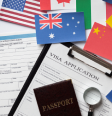An immigration visa (also referred to as an immigrant visa) allows foreign nationals to enter and live permanently in a country. It is usually granted to individuals who intend to settle in the country and, in some cases, eventually seek citizenship. Immigration visas typically provide the holder with the right to work, live, and sometimes even access certain social services in the destination country.
The requirements, application process, and eligibility criteria for immigration visas vary depending on the country and the type of visa. Immigration visas are generally divided into several categories, such as family-sponsored visas, employment-based visas, investment visas, and refugee or humanitarian visas.
Choose Country of Your Choice
General Categories of Immigration Visas:
-
Family-Sponsored Immigration Visas:
- These visas allow individuals to immigrate to a country based on their close relationship with a citizen or permanent resident of that country. Common categories include:
- Immediate family members: Spouses, children, parents, and sometimes siblings of citizens or permanent residents.
- Fiancé/fiancée visas: Issued to individuals engaged to a citizen or permanent resident, allowing them to enter the country and get married.
- These visas allow individuals to immigrate to a country based on their close relationship with a citizen or permanent resident of that country. Common categories include:
-
Employment-Based Immigration Visas:
- These visas are granted to individuals based on their professional skills, qualifications, or job offer. There are usually several tiers or preferences for employment-based immigration:
- Skilled workers: Professionals with specialized skills or advanced degrees in fields such as technology, engineering, medicine, etc.
- Intra-company transfers: Employees of multinational companies being transferred to a branch or affiliate in another country.
- Labor market needs: Visas for workers in industries with labor shortages.
- These visas are granted to individuals based on their professional skills, qualifications, or job offer. There are usually several tiers or preferences for employment-based immigration:
-
Investor and Entrepreneur Visas:
- Some countries offer immigration visas to foreign nationals who invest a significant amount of money in local businesses or create jobs for citizens. These are often referred to as “investment visas” or “entrepreneur visas.”
-
Diversity Visa (Lottery Visa):
- Certain countries, like the United States, have immigration programs that select individuals randomly from countries with low immigration rates to encourage diversity. Applicants usually need to meet basic education or work experience requirements.
-
Refugee or Humanitarian Visas:
- These visas are issued to individuals who are fleeing persecution, war, or human rights abuses in their home countries. Refugee visas are based on humanitarian needs and are often coordinated by international organizations, such as the United Nations.
-
Asylum:
- Asylum seekers apply for protection after arriving in a country, claiming they face persecution in their home country. If granted asylum, individuals are typically allowed to stay and may eventually apply for permanent residency or citizenship.
General Steps for Obtaining an Immigration Visa:
-
Determine Eligibility:
- Before applying for an immigration visa, check the specific eligibility requirements for the country and category you are interested in. For example, family sponsorship visas require proof of a relationship, and employment-based visas require specific job offers or skills.
-
Submit a Petition or Application:
- In many cases, the process begins with someone in the destination country, such as a family member or employer, submitting a petition or sponsorship on your behalf. This is common for family-based and employment-based immigration.
- For other categories, such as investor or refugee visas, the applicant may file the visa petition directly.
-
Gather Required Documents:
- Immigration visa applications often require extensive documentation, including:
- Valid passport: Your passport must be valid for at least six months beyond your intended stay.
- Proof of eligibility: This could include a job offer, proof of family relationship, educational degrees, or financial resources.
- Medical exam: Most countries require a medical examination to ensure you do not have contagious diseases or serious health conditions.
- Police clearance certificate: A background check or certificate showing that you do not have a criminal record.
- Financial proof: Some visas require proof that you or your sponsor can support you financially.
- Immigration visa applications often require extensive documentation, including:
-
Attend Visa Interview:
- After submitting your application, many countries require you to attend a visa interview at an embassy or consulate. You’ll likely be asked about your intentions to immigrate, your qualifications, and how you plan to support yourself or your family.
- You may need to submit additional documents during or after the interview.
-
Medical Exam and Biometrics:
- Most immigration visa applications require you to undergo a medical exam and provide biometric data (fingerprints and photographs). These are usually completed before or during the visa interview.
-
Visa Approval and Processing Time:
- The processing time for immigration visas can be lengthy, taking several months or even years, depending on the visa type, country, and backlog of applications.
- Once approved, you will receive an immigrant visa in your passport, which allows you to travel to the destination country and begin the process of obtaining permanent residency.
-
Travel to the Destination Country:
- After receiving your immigrant visa, you can travel to the destination country. Upon arrival, you may be granted permanent resident status or be required to take further steps, such as applying for a residence permit or completing additional administrative procedures.
-
Residency and Citizenship:
- In most countries, an immigration visa leads to permanent residency (or a similar status, such as a Green Card in the United States), which allows you to live and work in the country. After a certain number of years as a permanent resident, you may be eligible to apply for citizenship.
Specific Immigration Visa Programs by Country:
1. United States (Green Card, Family, and Employment-Based Visas):
- Family-based Green Cards: Immediate relatives (spouses, children, parents) of U.S. citizens or permanent residents can apply for a Green Card.
- Employment-based Green Cards: Divided into five categories (EB-1 to EB-5), which prioritize highly skilled professionals, individuals with extraordinary abilities, and investors.
- Diversity Visa Lottery: Annually offers 55,000 visas to applicants from countries with low immigration rates to the U.S.
- Processing time: Depending on the visa category, processing can take from several months to many years.
2. Canada (Express Entry, Family Sponsorship, Provincial Nominee Program):
- Express Entry: A points-based immigration system for skilled workers. Applicants are scored based on factors like education, work experience, age, and language proficiency.
- Family Sponsorship: Canadian citizens and permanent residents can sponsor spouses, partners, children, parents, and grandparents for permanent residency.
- Provincial Nominee Program (PNP): Allows provinces to nominate individuals who meet local labor market needs for immigration.
- Processing time: Express Entry applications are typically processed within six months.
3. United Kingdom (Family and Skilled Worker Visas):
- Family Visas: Spouses, children, and other close relatives of UK citizens or permanent residents can apply to join them.
- Skilled Worker Visa: For professionals with job offers from a UK employer that holds a sponsor license.
- Investor Visa: For individuals who invest a substantial amount of money in the UK economy.
- Processing time: Varies depending on the visa category but generally takes several weeks to months.
4. Australia (Family and Skilled Migration Visas):
- Skilled Migration Visa: Based on a points system that evaluates age, skills, English proficiency, and work experience.
- Family Visa: Allows spouses, partners, children, and other relatives of Australian citizens or permanent residents to immigrate.
- Business Innovation and Investment Visa: For individuals with business skills or those who invest in Australia.
- Processing time: Generally ranges from a few months to over a year.
5. Germany (EU Blue Card, Family Reunion Visas):
- EU Blue Card: For highly skilled non-EU workers with a job offer in Germany. It offers a path to permanent residency.
- Family Reunion Visa: Allows close family members of German citizens or residents to join them.
- Processing time: Depending on the visa category, applications can take from several months to a year.
Key Considerations:
- Visa Quotas: Some immigration visas, especially employment-based ones, may be subject to annual quotas or caps, which can affect waiting times.
- Path to Citizenship: Immigration visas often lead to permanent residency, and after several years, you may be eligible to apply for citizenship, depending on the country’s laws.
- Dual Intent Visas: Some countries, like the U.S., allow certain visa types (like H-1B or L-1) to be dual-intent, meaning you can apply for permanent residency (Green Card) while on a temporary visa.
- Financial Requirements: Immigration visas may require proof that the applicant or their sponsor can financially support them.
Immigration visas allow individuals to settle permanently in a new country, providing a path to residency and, in many cases, eventual citizenship. Each country has its own immigration policies and visa categories, so it’s important to follow the official guidelines and procedures.

Fill In The Required Form
We offer comprehensive employment services such as assistance with employer compliance.

Submit Your Original Documents
We offer comprehensive employment services such as assistance with employer compliance.

Get The Visa Resource Material
We offer comprehensive employment services such as assistance with employer compliance.
There are full service engage company is to provide solution for employees needs training manage the entire HR department for companies. We offer comprehensive employment services such as assistance with employer compliance.Our company is your strategic HR partner as instead of HR.
Visa Question Related to Immigration Process
For the Heart's Reunion: Bridge the distance and bring your loved ones closer with a Family Visa. Designed to reunite families across borders, this visa strengthens bonds and ensures you can create a shared life with those who matter most, no matter where in the world you choose to call home.







